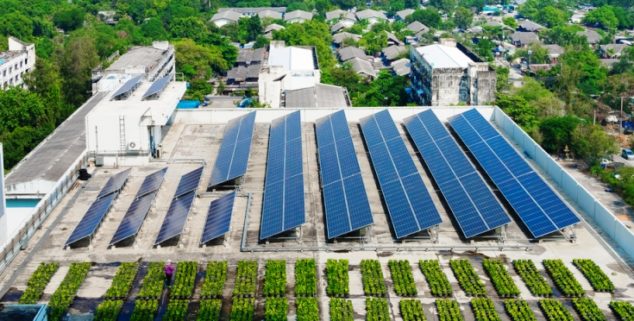Opinion
Community clean energy greatly helps those left behind
 Solar panels clustered in an urban environment to provide energy to surrounding buildings, homes. (Photo: Gengwit Wattakawigran. via Shutterstock)
Solar panels clustered in an urban environment to provide energy to surrounding buildings, homes. (Photo: Gengwit Wattakawigran. via Shutterstock)All Californians have the right to access affordable clean energy. However, the majority of Californians are unable to take advantage of solar energy generated at their home because they are renters or homeowners without a suitable roof. These significant barriers are not adequately addressed through California’s existing clean energy programs.
That’s why state lawmakers should pass AB 2316, a bill to establish a new community solar program.
This bill allows any customer to receive benefits from community-based clean energy facilities regardless of whether they own a home. The program would empower customers to save on their energy bills, invest directly in their local community, and help fight climate change.
Many other states are already using community solar with great success. In fact, the Biden Administration wants community solar to reach 5 million households by 2025 and create $1 billion in energy bill savings.
This is not a new idea — but rather it makes available a proven path to expand access to clean energy.
After a few short years in the State of New York, community solar provides enough power for 200,000 homes. It made up 70 percent of the state’s solar installations last year and, with many more in development, is growing rapidly. California has been a long-time leader in solar power and it is time for us to implement this program here.
Community investments include small-scale solar and storage installations built on landfills, former industrial sites, or small parcels of private land. Revitalizing these sites into locations that generate green energy is just common sense.
Community solar can be more accessible for Californians. Customers can sign up as subscribers or purchase shares of a project equal to their energy needs and then earn credits that reduce their electric bills. A subscription would be portable and follow a customer when they move to a new residence.
This community solar proposal focuses on equity by requiring over half the power generated by each project to directly benefit low-income customers or service organizations. The legislation would also provide these customers with additional financial incentives to participate.
Rather than have a distant power plant, community solar projects will yield local benefits to the communities they serve. This includes the construction of the facilities by paying workers a fair living wage.
The bill will also help every Californian by improving the resiliency of our power grid and reducing the risk of blackouts. The bill requires community solar projects to include energy storage, which creates a clean power reserve when the sun sets. The combination of solar and storage will reduce California’s reliance on old and dirty power plants.
A diverse coalition of organizations representing clean energy, the environment, and low-income communities urges the advancement of this bill.
The time has come to step up our commitment to clean energy and a decarbonized electricity system. AB 2316 offers a valuable tool to achieve these goals efficiently with the benefits focused on vulnerable customers and renters — two populations that have been left behind by current policies.
Lawmakers should endorse this effort to unlock consumer-friendly options that provide tangible benefits to subscribers, avoid new rate increases for all customers, and accelerate progress towards the state’s 100 percent clean energy goal.
—
Editor’s Note: Matthew Freedman is staff attorney for The Utility Reform Network, specializing in clean energy policy and regulatory issues. Michael Colvin is the director of the California energy program for the Environmental Defense Fund.
Want to see more stories like this? Sign up for The Roundup, the free daily newsletter about California politics from the editors of Capitol Weekly. Stay up to date on the news you need to know.
Sign up below, then look for a confirmation email in your inbox.

Leave a Reply